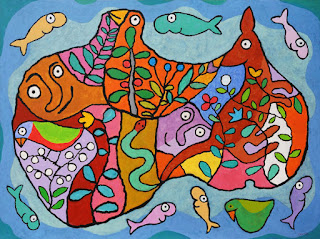For example, the book of Joshua reads as if Israel was totally victorious, whereas Judges paints a picture of a nation dogged on all sides by her enemies and her errors. Different stories from the same time and place, different overall impression.
Samuel, Kings and Chronicles have many stories and characters in common, yet there's a different slant on each character or event depending on the source. Multiple 'stories' for the same events.
Not content with this level of nuance, however, the Bible goes even further at its central event: the death and resurrection of Jesus. For this one set of events, we're furnished with a myriad of different metaphors to convey its meaning: Jesus as ransom, Jesus as redeemer, Jesus as propitiation, Jesus victorious cosmic warrior, Jesus as perfect example and so on. The exact same event being loaded with multiple 'meanings'.
The Bible and (largely) Christians are ok with this. In fact, it's a part of the richness of the Christian faith that has seen it minister to the souls of millions for over 2,000 years across every cultural, racial and temporal barrier we know. It's the telling of these different stories that nourishes and forms those who would follow after Jesus in laying down their lives to bless others.
 This, I think, shows us modern Australians a way forward as we grapple with the complex nature of our identity and history. Particularly, in the controversy of how to celebrate our national day.
This, I think, shows us modern Australians a way forward as we grapple with the complex nature of our identity and history. Particularly, in the controversy of how to celebrate our national day.In so many ways, Australia is a place of multiple stories. Different stories about the same time and place that give different impressions to each other. Of multiple 'stories' for the same events. Of the exact same event being loaded with multiple meanings.
Australia is this legitimately. Understandably. Truthfully.
I think this means that if we are to have a truly 'Australia' Day, then it can only be a day where these different stories are told. Stories of dispossession side by side with stories of refuge and hope. Stories of ancient belonging next to stories of proud domination. Stories of thankfulness alongside dirges of mourning.
Australia is all of these stories. Should not the character of our day be the telling of them? A day of national storytelling. As they're told and as they're heard, we would in turn cry and laugh. We would be aghast and then relieved. We would hurt and hug. Together. And perhaps, through the rugged experience of telling our stories and being heard, together come to a peace.
If all Australia Day celebrations were storytelling events of multiple stories, I think it would change us.
I don't know on which day this should happen. I suspect some whose stories are of dislocation, loss and disorientation would prefer to tell those stories on a different day than the 26th. But I can't help but wonder if the pain of that day is the reason it's the day to hear exactly those stories. I suspect many would tell them.
If we invite them. And if we turn our ear to listen.





